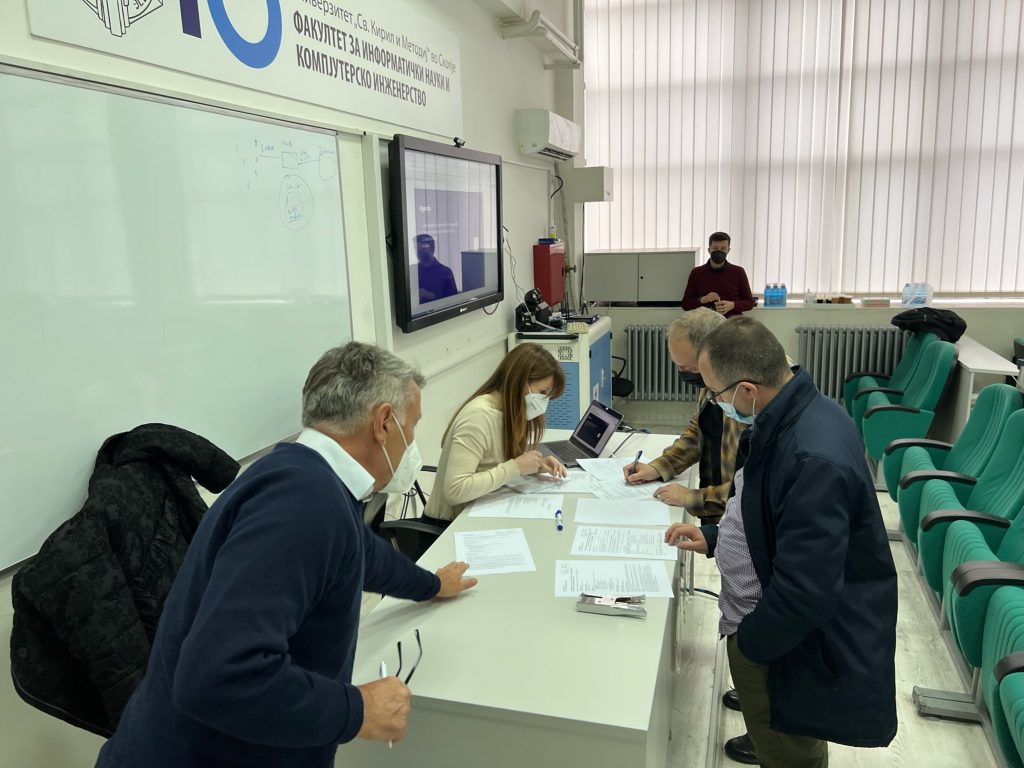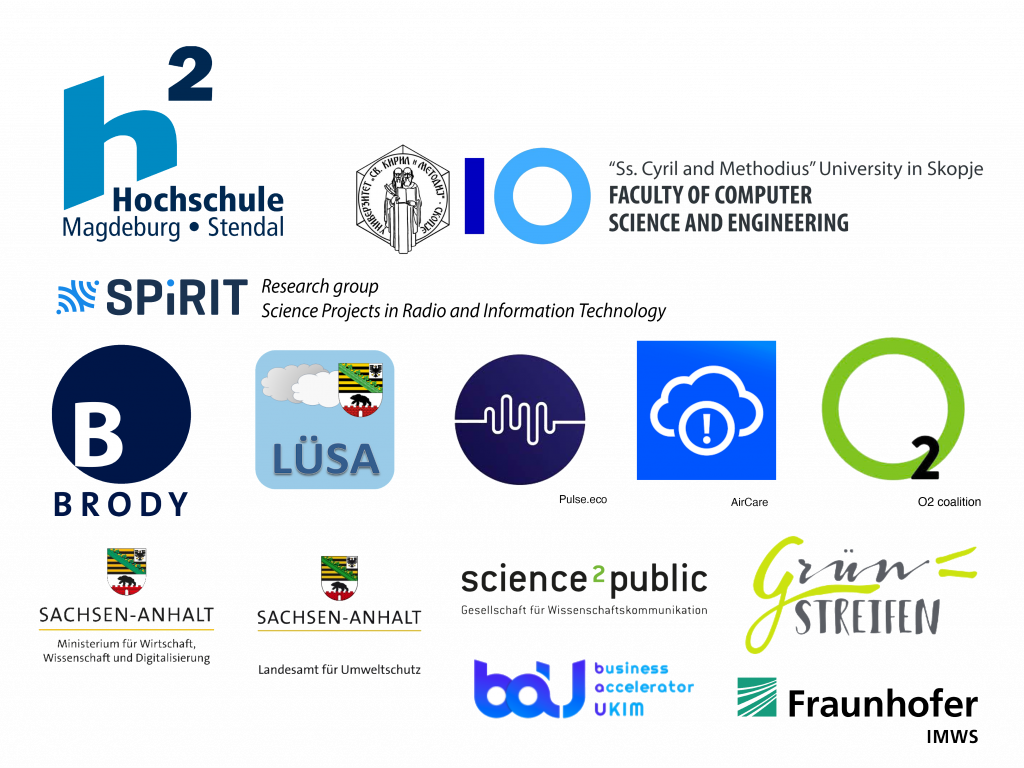project Partner
CleanBREATHE is a cooperation of the SPiRIT Research Group at Magdeburg-Stendal University of Applied Sciences (MD-SDL) in Germany and the Faculty of Computer Science and Engineering (FCSE) at the Ss. Cyril and Methodius University in North Macedonia.

As an applicant for EU membership, N. Macedonia is engaged in the accession procedure, aiming to meet all EU standards and regulations, including the European Clean Air Package (European Council, 2020).
CleanBREATHE is in line with these ambitions, as it addresses air quality improvement, brain drain as well as business benefits in N. Macedonia. Moreover, the project will expand each partner’s scientific community and enhance exchange between the two countries. It also increases academic personnel and student mobilization between Germany and N. Macedonia.
Under certain conditions, air pollution in the Westbalkan region might also impact air quality in Central Europe. The State Office for Environmental Protection of Saxony-Anhalt has confirmed that reverse trajectory calculations can be used to determine how air masses move across the continent and where polluted air originates.
Project Duration
Grant
Consortium
1.10.2021 – 31.09.2024
430 T€ Federal Ministry of Education and Research (BMBF, WBC2019)
Magdeburg-Stendal University of Applied Sciences, Department of Economics, Research group SPiRIT, Prof. Dr. Michael A. Herzog (lead), Victoria Batz, M.A. (project management)
Ss. Cyril and Methodius University in Skopje, North Macedonia, Faculty of Computer Science and Engineering (FCSE), Laboratory for Eco-Informatics, Prof. Vladimir Trajkovik, Ph.D. (Co-Lead)
Business Innovation Coach Brody & Associates, San Francisco, USA
Project coordinator
Prof. Dr.-Ing. Michael A. Herzog (Magdeburg-Stendal University of Applied Sciences), SPiRIT Research Group, Department of Management and the Department of Electrical Engineering.
Michael A. Herzog and Olaf Friedewald established the interdisciplinary research group SPiRIT (Science Projects in Radio and Information Technology) as a think tank and project development group in the summer of 2012. The research focus of SPIRIT is in the integration of Human-Computer Interaction (HCI) and Electrical Engineering with a particular emphasis on applications in Technology Enhanced Learning (TEL).
SPIRIT research projects integrate advanced technology exploration with the development of actionable modeling towards usable prototypes in industrial and consumer environments. A particular focus on complex information systems in educational and managerial contexts drives the development of smart, context-sensitive learning devices in museums, exhibition spaces, and industrial environments. Research Outcomes include Particle and Wave Simulator for Indoor Location algorithms, implemented in a Unity3D demonstrator (Hatscher & Herzog, 2016); Online Marketplace (halloaltmark.de); SocialMedia, E-Portfolio and Alumni services platform integrated into University Information Architectures (Helmich, Herzog & Neumann, 2014); Educational prototypes in public spaces, museums, and churches: Augmented Reality, (Batz et al., 2017), Interactive Gameboards, (Juraske et al., 2017), Context-Driven Content Presentation, (Herzog et al., 2016), Instant Church (Herzog et al., 2019a), Learning and teaching theory and its application in Technology Enhanced Learning (Herzog & Katzlinger, 2017; Herzog et al., 2018; Herzog et al., 2019b).
Co-Lead
Prof. Vladimir Trajkovik, Ph.D., Faculty of Computer Science and Engineering (FCSE), Laboratory for Eco-Informatics
Prof. Kosta Mitrevski, Ph.D., Faculty of Computer Science and Engineering (FCSE), research group EcoInformatics
The Faculty of Computer Science and Engineering (FCSE) at the Ss. Cyril and Methodius University is the largest and most prestigious faculty in the field of computer science and technologies in N. Macedonia, with a teaching staff of 40 professors and 40 associates.
Business Innovation Coach
Florian Brody (Brody & Associates) is an innovation moderator and certified business coach. Born in Vienna, he has been working in the Silicon Valley for over 25 years, where he co-founded five start-ups. He has extensive expertise in supporting companies and research projects in the integration of research and innovation processes and combining them with marketable business models and marketing strategies. He contributed to the CleanBREATHE proposal and supports the project in the conceptual phase.
Associates
Business Accelerator UKIM is a business technology accelerator that will help identify and support promising technology companies, start-ups, spin-offs and scale-ups in Macedonia. The measures include tailor-made early-stage investments and access to international markets, networks and communities. Our contact person is Aleksandar Stamboliev.
The State Office for Environmental Protection of Saxony-Anhalt (LAU) fulfils the legal obligation for air monitoring and provides information. It operates measuring stations at 24 representative locations in Saxony-Anhalt. By participating in our project, LAU hopes to be able to pre-validate suitable measuring stations with the help of crowdsensing-based information technology. Furthermore, a contribution to the evaluation of existing stations is expected. In addition, greater awareness of the activities and topics of the LÜSA (awareness raising) is desirable. On the other hand, the project partners hope to gain insights from the data and information of the LÜSA – Advice on technical questions of air monitoring and the provision of test facilities. The project consortium could participate in workshops and other exchange formats.
The State Ministry for Economy, Science and Digitalisation of Saxony-Anhalt supports CleanBREATHE’s efforts to strengthen the regional research strategy and to collaborate with international partners.
Science2public is a science communication agency that was leading the OpenLabNet Make Science! research project. The agency will support us through an extended network of partners and consult the project on all technical questions regarding the scientific communication and knowledge transfer.
Fraunhofer Institute for Microstructure of Materials and Systems (IMWS) could support the consortium in the area of Citizen Science combined with aspects of air quality measurement. They have a wide range of experience from various projects like “OpenLabNet Make Science!”. The added value of the cooperation with the IMWS lies in the continuity of their own projects as well as in the contribution of the gained expertise.
Grünstreifen e.V. is an association that launched a citizen initiative measuring particulate matter in the city of Magdeburg (“Otto measures air quality”). The project consortium can benefit from this project in terms of Citizen Science and air quality measurement.
AirCare is a mobile app that uses open data from government and volunteer air quality sensors to map and visualize pollution in the Balkans (UNEP, 2018; Scott, 2018; Banovic, 2019). They will consult us on the development and implementation of technical issues and undertake joint research on infrastructures for digital supported learning.
Pulse eco is a crowdsourcing platform, which gathers and presents environmental data. The network of sensor installations and other third-party sources gathers the data and translates them into visual and easy to understand information about the pollution, humidity, temperature or noise in 15 cities in Balkan Region. They will mainly support our project in providing relevant data acquisition, presentation, and prediction, based on low cost sensors for air pollution. Furthermore, they will provide insights in scaling sensor networks and possibility to use the sensor network platform for the detection of pollution sources.
O2 coalition is a civil initiative advocating for systemic and sustainable environmental solutions. The initiative will support workshops educating citizens and students on air pollution topics, configure the sensor kits, and connect the project to more civil society actors.

BIBLIOGRAPHY
Banovic, R. (2019). Meet the Macedonian Software Engineer Fighting Air Pollution with an App. Forbes. Retrieved from https://www.forbes.com/sites/rebeccabanovic/2019/01/12/meet-the-macedonian-softwareengineer- fighting-air-pollution-with-an-app/
Batz, V., Blümel, F., Falkenberg, J., Haubert, E., Schumacher, D., Herzog, M. A. (2017). Experiencing Artwork with Augmented Reality. Interactive Perception of historical Statue “Belvedere Torso”. In: Busch, C., Kassung, C., Sieck, J.: Kultur und Informatik. Mixed Reality, vwh Verlag
European Council (2020). The clean air package: Improving Europe’s air quality. Retrieved from https://www.consilium.europa.eu/en/policies/clean-air/
Hatscher, B. & Herzog, M. (2016). Partikel- oder Wellensimulation? Zwei Ansätze zur Indoor-Lokalisierung auf Basis passiver RFID-Technik, In: Nissen, V., Stelzer, D., Straßburger, S., Fischer, D. (Hrsg.): Multikonferenz Wirtschaftsinformatik (MKWI) 2016, Teilkonferenz Von der Digitalen Fabrik zu Industrie 4.0, Universitätsverlag Illmenau, pp. 1749-1761. 14.
Helmich, O., Herzog, M. & Neumann, C. (2014). Seamless and secure integration of SocialMedia, E-Portfolio and Alumni services into University Information Architecture. In: International Journal of Computing, CISJ. 2014, Vol. 13, Issue 2.
Herzog, M. A., Franz, L., Katzlinger, E. & Stabauer, M. (2018). CROSSTEACHING: Interuniversity Research- Based Learning in Virtual Teams. In Dan Remenyi (Eds.), 4th E-Learning Excellence Awards 2018: an anthology of case histories. Reading: Academic Conferences and publishing limited.
Herzog, M. A., & Katzlinger, E. (2017). The Multiple Faces of Peer Review in Higher Education. Five Learning Scenarios developed for Digital Business. In: EURASIA Journal of Mathematics, Science and Technology Education, 13(4), 1121-1143.
Herzog, M. A., Kubincová, Z., Han, P. & Temperini, M. (ed.) (2019b). Advances in Web-Based Learning – ICWL 2019. 18th International Conference, Magdeburg, Germany, Proceedings, Springer LNCS. 20. Iivari, N. & Kuutti, K. (2017). Towards Critical Design Science Research. ICIS 2017 Proceedings, http://aisel.aisnet.org/icis2017/ResearchMethods/Presentations/10
Herzog, M. A., Schott, D., Greif, C., Schumacher, D., Brody, F. T., & Herrklotsch, S. (2019a). Deus ex Machina: The Automation of a Religious Ritual in a Data-Driven Machine–Design, Implementation, and Public Reception. In Handbook of Research on Human-Computer Interfaces and New Modes of Interactivity, IGI Global 2019, pp. 71-95.
Herzog, M. A., Wunderling, J., Gabele, M., Klank, R., Landenberger & M., Pepping, N. (2016). Context Driven Content Presentation for Exhibition Places. Four Interaction Scenarios Developed for Museums. Electronic Imaging & the Visual Arts Conference EVA 2016, St. Petersburg.
Juraske F., Oefler, T., Sommermeier K., Vogel, S., Schumacher, D., Herzog, M.A. (2017). An Interactive Gameboard for Categorization and Examination of Engraved Gems for the Winckelmann Museum. In: Busch, C., Kassung, C., Sieck, J.: Kultur und Informatik. Mixed Reality, vwh Verlag.
Scott, M. (2018). Improving Lives & Air Quality through Open Data Innovation. Open NASA. Retrieved from https://open.nasa.gov/blog/improving-lives-air-quality-through-open-data-innovation/
UNEP (United Nations Environment Programme) (2018). The most polluted capital in Europe, you didn’t even know about. UNEP. Retrieved from https://www.unenvironment.org/news-and-stories/story/most-pollutedcapital- europe-you-didnt-even-know-about

